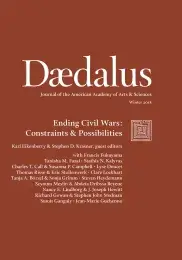The United Nations & Civil Wars
The UN engagement in civil wars was almost nonexistent until the end of the Cold War, but recent experience brings some important lessons: the traditional principles of peacekeeping are ill-suited for civil war, as demands on peacekeepers, in particular the protection of civilians, are expanding. But military force is there to support a political strategy. The UN must focus on politics, using its comparative advantage–its independence–to win the confidence of the parties, while preserving its access to big powers to put pressure on them. However, it is challenged by the growing divisions in the Security Council, the changing nature of conflict, and a crisis of states that reflects long-term trends. This is not a reason for the UN to abandon its role in ending civil wars, but it needs to recalibrate its ambitions and adapt its approach: be less state-centric and more inclusive; more robust militarily; and more disciplined in its priorities.
The United Nations was not designed to deal with civil wars. It is an organization of sovereign states that decided, at the end of World War II, that their relations should be governed by a set of binding rules, enshrined in a charter, and policed by a select group of nations in the form of the Security Council. The international order that the charter of the United Nations organized is based on the assumption that sovereign states, as the building blocks of the international system, are the benevolent custodians of their people; and the main purpose of the charter is to regulate relations between sovereign states while refraining from interfering with their domestic affairs, including civil wars.
Paragraph 7 of article 2 of the charter explicitly states:
Nothing contained in the present Charter shall authorize the United Nations to intervene in matters which are essentially within the domestic jurisdiction of any state or shall require the Members to submit such matters to settlement under the present Charter; but this principle shall not prejudice the application of enforcement measures under Chapter VII.
This paragraph was the result of difficult discussions in San Francisco. France had initially argued that violations of human rights could be a basis for intervention, but this view was strongly rejected by the American delegation, and a few years later, when the Algerian War of Independence started, a preparatory report of John Foster Dulles that had been the basis for that rejection would be quoted in a French periodical to justify the French position.1 France had come to agree with the United States that there should be no exception to the principle set in paragraph 7 of article 2 of the charter. That is why, until the end of the Cold War, the United Nations did not concern itself with civil wars, with the two exceptions of the Congo, where its role was to protect the integrity of a state emerging from decolonization, and Cyprus, which involved a confrontation between two states (Turkey and Greece).
The end of the Cold War opened a new chapter: there have been fewer interstate wars and more civil wars; and the less-divided Security Council has authorized twice as many operations in the last twenty-six years as it authorized in its first forty-four years, and most of the new missions have been deployed to accompany peace processes aimed at ending civil wars. Based on the assumption that the stabilization of a postconflict country requires a “comprehensive approach,”2 they have been increasingly multidimensional, often including political, military, development, and humanitarian components.3
. . .
